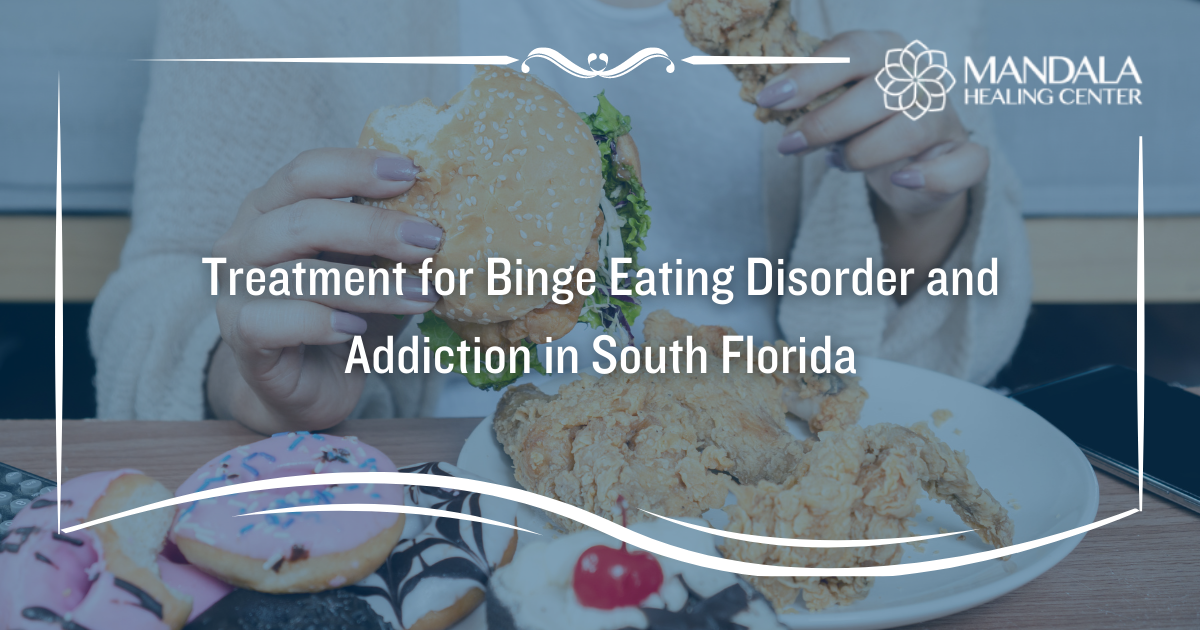Addiction is a condition that commonly occurs with other mental illnesses. According to the Substance Abuse and Mental Health Services Administration (SAMHSA), “approximately 9.2 million adults in the United States have a co-occurring disorder.”[1]
Binge eating disorder is a type of eating disorder that causes people to eat large quantities of food, feel extreme levels of shame about it, and feel out of control when it comes to food This eating disorder commonly co-occurs with addiction, as it causes high levels of guilt, shame, and low self-esteem. People who suffer from binge eating disorder tend to abuse substances to cope with the inner turmoil they face as a result of their condition.
Studies show people with binge eating disorders are two times more likely to suffer from addiction than the general population.[2] Experiencing binge eating disorder and addiction at the same time can make it extremely difficult for you to perform in your daily life. Thankfully, dual-diagnosis treatment centers can help you overcome the effects of these conditions with evidence-based therapy and nutritional counseling.
How are Binge Eating Disorder and Addiction Treated in South Florida?
Binge eating disorder (BED) and addiction must be treated at the same time to ensure that you make a full recovery from both conditions before you leave the safety of the facility. When you attend treatment for binge eating and addiction, you will engage in a variety of evidence-based treatments that will teach you how to manage your conditions healthily.
Medical Detox
When you suffer from addiction, your body relies on the substance you are dependent on to function normally. Once you stop using that substance, you will experience symptoms of withdrawal that can be dangerous without medical support. As a result, the first step in treatment is always medical detox.
Medical detox involves the use of medications to soothe your symptoms of withdrawal and prevent cravings. Depending on the type of substance you were addicted to, you may be given tapering medications that allow your body to slowly adjust to less and less of a drug. In addition to medication, the medical staff at a detox center will monitor your vitals consistently to ensure that you are medically stable, safe, and comfortable.
Behavioral Therapy
One of the most important aspects of dual diagnosis treatment is behavioral therapy. Behavioral therapy can help you reframe the way you feel about food and your body image. It can also help you learn healthy coping skills to avoid binge eating or substance abuse.
The common forms of therapy used to treat binge eating disorder include:
- Cognitive behavioral therapy (CBT)
- Interpersonal therapy (IPT)
- Mindfulness-based eating awareness training (MB-EAT)
- Family therapy
- Group counseling
For addiction, the most commonly used behavioral therapies include:
- Cognitive behavioral therapy (CBT)
- Motivational interviewing (MI)
- Contingency management (CM)
- The matrix model
- 12-step facilitation therapy
- Family behavior therapy
- Group counseling
Nutritional Counseling
A huge aspect of recovery from binge eating disorder is developing a healthy relationship with your body and food. Nutritional counseling can help you learn how to care for your body healthily, eventually leading to increased self-esteem and self-love.
Nutritional counseling teaches you how to reconnect with your body through healthy food. You will work with a licensed nutrition expert to learn how to eat healthy foods that you enjoy. Once you are eating healthy, you will begin to notice how much better you feel, motivating you to continue fostering a positive relationship with eating.
Nutritional counseling can also help you replace any nutrients you may be lacking in. Frequent substance abuse can cause nutritional deficiencies, especially when you consider that healthy eating is not a priority during active addiction. Your nutritionist can provide you with vitamin and mineral supplements to ensure that your body has everything it needs to recover.
Relapse Prevention Planning
Before you complete your treatment program, you will participate in something known as relapse prevention planning. This process ensures that you have all of the tools you need to maintain your recovery outside of the rehab facility. When you are in treatment for a substance use disorder and binge eating disorder, you will receive training on relapse prevention for both conditions.
Relapse prevention plans usually include the following:
- Continued attendance of therapy for addiction and BED
- Continued medication management if needed
- Referrals to sober living housing programs
- Recommendations on support groups to attend for addiction and BED
- A list of triggers for substance abuse and binge eating
- A list of coping mechanisms to combat your triggers
- People you can call for support in times of need
- Access to an alumni program that provides support and community
Find Treatment for Binge Eating Disorder and Addiction in South Florida
If you or a loved one suffer from addiction and an eating disorder, help is available. Living with these conditions can be extremely difficult, oftentimes causing serious adverse effects on your physical and mental health. A dual-diagnosis program will allow you to overcome the long-term effects of these conditions.
At Mandala Healing Center, Our dietician evaluates each new patient at the point of his or her particular phase of recovery. Nutritional re-evaluations are then held at Mandala on an ongoing basis. These private sessions are designed to be collaborative and empowering with an emphasis on instilling healthful, lifelong eating habits. Additionally, patients may participate in special group sessions and fun, hands-on cooking classes where they are taught the valuable life skill of learning to prepare their own healthy foods.
Contact Mandala Healing Center today for more information on our binge eating disorder and addiction treatment program.
References:
- https://www.samhsa.gov/medication-assisted-treatment/medications-counseling-related-conditions/co-occurring-disorders
- https://www.ncbi.nlm.nih.gov/pmc/articles/PMC4154572/












